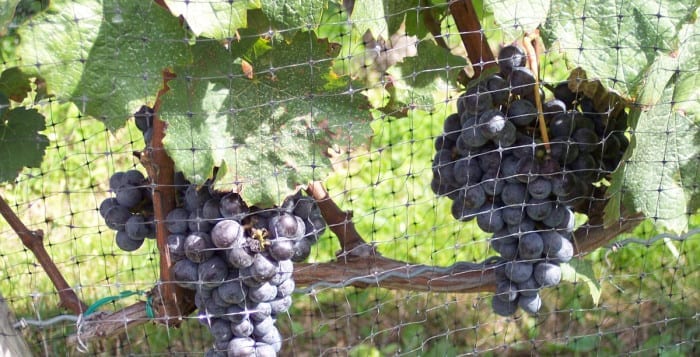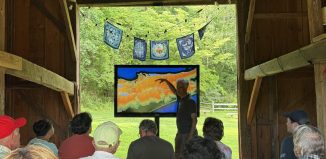Growing grapes on Long Island
By Ellen Barcel
Many years ago, Long Islanders were surprised to see a growing wine industry developing here. Now, it’s taken for granted that the East End is a wine producing region. Who knew that our climate (with 200 to 220 frost-free days) was ideal for growing grapes and therefore making wine? Obviously, some very astute growers who began replacing the farms on the East End with vineyards did, the first vines being planted in 1993.
If you decide that you want to plant some grapes on your property, you first need to determine what you want to do with these grapes. You may just like the appearance of an arbor with grapes growing on it. Maybe you enjoy eating grapes right off the vine. Or perhaps you wish to make grape jelly or maybe, like the growers on the East End, you may want to make wine.
The decision is a first step and important because it determines what type of grapes you are going to be planting. For example, suppose you want grapes to munch on. Then you’re going to be looking for seedless varieties.
There are three general types of plants, American (Vitis labarusca, native to the northeastern part of the United States, with many improved cultivars including Concord grapes and other varieties of table grapes), European (V. viniferia, used extensively in wine production) and North American native muscadine (V. rotundifolia, native to the southeastern part of the United States).
Another factor to consider is the climate zones where the vines will thrive. We are located in U.S. Department of Agriculture hardiness zone 7 and we receive between three and four inches of rain a month. But, as we’ve seen last summer, that rainfall is an average. We were at near drought conditions this past summer. You may need to supplement the rain.
Cornell Cooperative Extension of Suffolk notes that grape vines do well in a variety of soil types, but, need a well-drained soil. If you have clay soil, they won’t do well. Your soil’s acidity or alkalinity is also a factor. Native grapes do well in a soil pH as low as 5.5 (very acidic) while V. vinifera need a pH of 6.5 to 7 (near neutral). So, you may find that you need to add lime to your soil. It can take more than one growing season for lime to affect your soil’s pH. Read the package directions carefully and remember that once you begin to change the soil’s chemistry, you need to continue year after year or your soil will revert to its original pH.
In considering the location for planting your grapes, note that they need a very sunny location, but a well-placed grape arbor in a sunny location can produce a shady spot for sitting and enjoying a cool beverage on a hot summer’s day or a shady walkway.
Since grapes are vines, you need to prepare the location with a trellis, arbor or other type of support. Be prepared to put some netting over the ripened grapes since the birds will love them. So will deer, squirrels and rabbits. Regarding animals, in the same way that dogs should not have chocolate, they shouldn’t have grapes either, so make sure Fido doesn’t help himself.
Most grape varieties are self-fertile. When you look through the gardening catalogues or tags on plants, make sure to check. If you need other plants to pollinate, the description should tell you. Look for plants that are disease resistant, as well. You may notice roses growing at the end of some vineyards on the North Fork. Roses are seen by some as the “canary in the mine,” showing problems before the grape vines do. This gives the grower a chance to save the vines.
According to the Old Farmer’s Almanac, most grape vines will produce for 30 or more years, so this is a “plant once, enjoy for many years” type of plant — I just love those!
Growing grapes is a multiyear project since it is recommended that the vines not be allowed to fruit the first year and, as you can see, growing grapes requires quite a bit of research. Winter is an ideal time to begin doing that research so that come spring, you can select and plant the correct varieties and locations to produce what you want.
Ellen Barcel is a freelance writer and master gardener. Send your gardening questions and/or comments to [email protected]. To reach Cornell Cooperative Extension and its Master Gardener program, call 631-727-7850.







